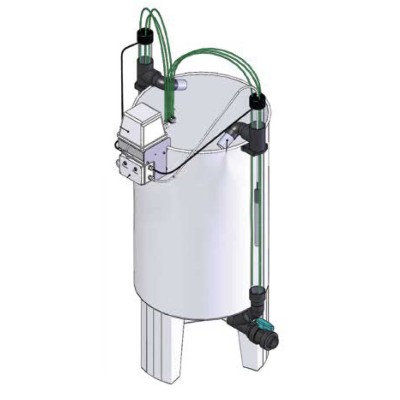Compost tea machine
Machine to make compost teas and foliar fertilizers.
Due to the variability of the raw material price, we prefer to quote. This allows us to include the transport price depending on the place of delivery.
In partnership with the Eco-Dyn company, we offer a compost tea machine or foliar fertilizers in biodynamic agriculture and viticulture.
Construction
Stainless steel tank with a system allowing to form a vortex at a defined temperature for a duration of 24 hours.
Video of the machine in operation (a new, more explicit video will be produced this year)
Compost tea
Compost tea is a liquid rich in microorganisms extracted from good quality compost that are multiplied by feeding them with molasses and a malted barley fertilizer enriched with mycorrhizae. The extraction process lasts about 24 hours at a temperature of 25°C and is done in a machine with a vortex oxygenation system. Diluted with water, this product is sprayed on the plants in order to increase their photosynthetic capacity, their vigor and their resilience in the face of bio-aggressors and different types of stress.
The ingredients of compost tea for a volume of 200 liters
According to the basic recipe by Dr. Ingrid Hörner
- 200 liters of good quality water. In the case of chlorinated water, let the machine run for 3 to 4 hours. To avoid this type of problem and ensure that you have quality water, it is also possible to use reverse osmosis water.
- 30 g BioAktiv Plantes (energy component) or Guérande salt)
- 100 g basalt powder (mineral component (trace elements) - e.g. Eifelgold)
- 300 g sugar cane molasses (component to feed micro-organisms; do not use vinasse)
- 200 g Maltaflor with mycorrhizae (fertilizer based on malted barley)
- 1 liter of good quality compost (source of bacteria, fungi and humic substances - preferably use old wood compost - do not use young composts or vermi-compost, unless the latter is very mature and passes the test watercress). Check the quality of the compost tea with the watercress test: put 150 ml of the compost in two 500 ml glass jars. Moisten the compost well using a spray bottle, place about twenty watercress seeds in it, and close one of the two pots hermetically. If the compost is of good quality the watercress in both pots should germinate and emerge without problems.
- 0.5 liters of good potting soil from a deciduous forest.
- Depending on crop needs, mineral supplements, humic acids, etc. are added. when filling the sprayer.
Making compost tea
Fill the machine with water and start it up. If necessary, pre-treat the water there for 4 to 6 hours to eliminate chlorine and neutralize the effects of limescale.
Set the temperature at 25°C (+/- 3°C) and maintain it for 24 hours. At 20°C for up to 48 hours. At 30°C only 12-15h (control by the formation of foam - the compost tea is ready to use when the foam cap begins to fall).
Add the ingredients in the order of the list above: we always start with the BioAktiv followed by the basalt. The molasses is first dissolved in 5 liters of lukewarm water and the Maltaflor soaked and diluted for a quarter of an hour in a liter of water. Once homogenized, they are slowly poured into the machine.
Important : to avoid contaminating and thus losing the following batches, the machine must be cleaned immediately (once dried, the residues are difficult to remove and, due to a lack of oxygen, the aerobic micro-organisms risk suffocating and decompose anaerobically, so the process turns to putrefaction, the production of pathogens and bad smells.
Quality criteria
There is a typical smell and the formation of a foam cap. When it starts to fall the compost tea is ready to use.
Lack of foam and/or a putrefactive odor indicates a problem. It should therefore not be used.
Spraying
At the end of the process, the compost tea should be spread within a few hours.
If partial quantities are taken, the rest of the compost is removed, the volume taken is compensated with water and the machine is left to run. This ensures that the remaining quantity continues to be well oxygenated.
Dosage: 20 to 100 litres/ha for the vitalization of plants. 100 to 500 l/ha to stimulate soil life and for a pseudo-fertilization effect. Determine the dosage and the optimal composition (… in the event of the addition of other components) by comparative tests using a manual sprayer and various testers (see below).
Dilute the right amount of compost tea with the amount of water that, depending on the technical characteristics of the sprayer, allows application under good conditions. Minimum dilution 1:3, maximum 1:10. General rule: low dosage –> rapid effect, but of short duration (ideal for the first pass) higher dosage –> slower, but longer lasting effect (following passes)
To increase the effectiveness of compost tea sprays, different mineral and biological components can be added when filling the spray tank (ferments, humic acids, enzymes, seaweed extracts, etc.)
The refractometer and Horiba testers (pH, EC, Ca, K, NO3-), are high-performance instruments for testing the effectiveness of foliar spraying at the headland (see the document Sugar level and pH as criteria vigor, health and quality)
To aid the ripening of cereals a water-based extract of good quality hay can be sprayed after the last application of compost tea. It is a good source of organic silica which is also useful in other situations.
The favorable times for spraying are chosen according to the stages of development of the crop and the stress factors (heat, cold, lack of nutrients and water, physical stress (compaction, hail, etc.).












feedback Report comment